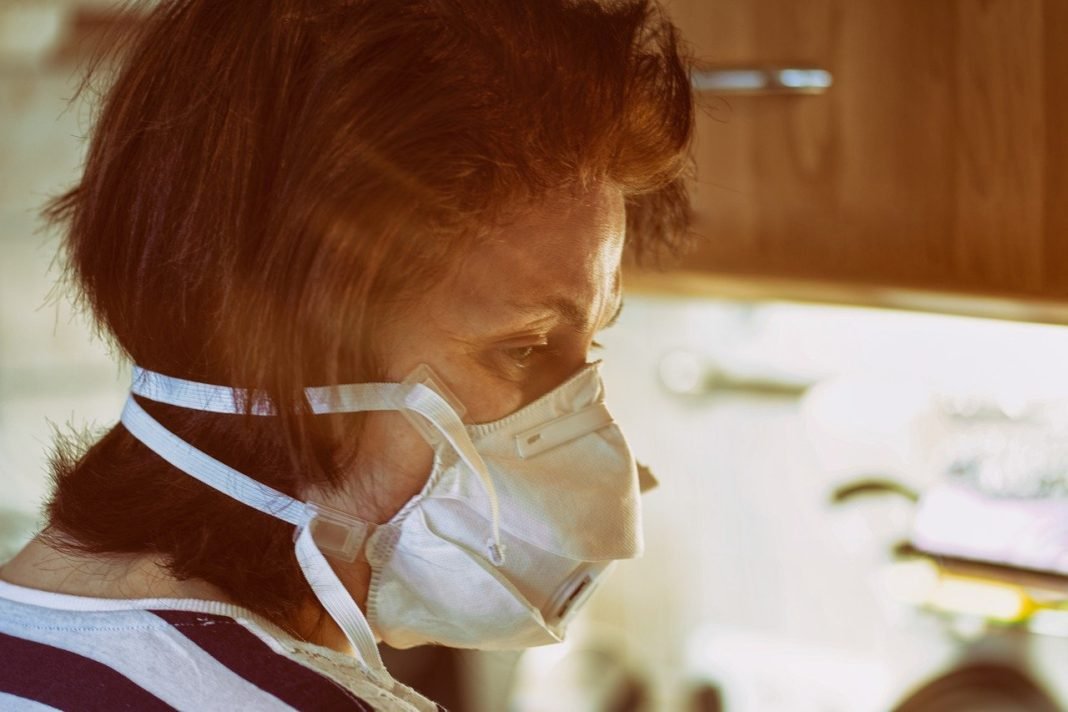With more than half of the world’s population under home lockdown due to the COVID-19 pandemic, cases of domestic violence have been increasing around the globe. In many of these cases, victims are unable to leave due to their economic situation or because the corona virus crisis limits their ability to find an alternative place to live. While the lockdowns are considered necessary to protect public safety during the pandemic, they’ve fostered a risky situation for those already in abusive relationships. Domestic violence perpetrators are already fragile individuals who cannot bear frustration, so the confinement will only worsen the situation. This paper presents a descriptive study which highlights the only gendered impact of lockdown that is increasing Domestic Violence (DV) on the most vulnerable groups of society that are women and children during lockdown after the spread of Covid-19. The present situation of women during lockdown, types of domestic violence they are going through, Government failure in implementing DV Act, Courts are closed, no legal aid, registering domestic violence: a big time dilemma for women, signs of controlling men and those women prone to Domestic Violence, methods to change the mindset of women and families to avoid getting into a situation involving Domestic Violence, measures taken by the Indian Government during Covid-19 lockdown for safeguarding the rights of abused women and limitations in implementing DV Act measures are described at length in the present paper.
Around the world, as cities have gone into lockdown to stop the spread of corona virus, the mass efforts to save lives have put one vulnerable group more at risk. Women and children who live with domestic violence have no escape from their abusers during quarantine. It is estimated that 47% of men and women will experience psychological IPV in their lifetimes. All races and sexual orientations experience IPV. National Criminal Justice Reference Service (NCJRS) of US in 2018 published the statistics for 20 years of trends related to Intimate Partner Violence (IPV) or domestic violence against a spouse or partner in an intimate relationship. NCJRS defines IPV as a situation in which “one partner asserts power and control over the other.” IPV is widely considered to involve “physical, sexual, and psychological abuse, as well as economic coercion. Contact sexual violence (which “includes rape, being made to penetrate someone else, sexual coercion, and/or unwanted sexual contact perpetrated by an intimate partner”) will be experienced by 16% of women. Those alarming figures log only cases where women are able to seek help, many cannot make calls because they fear being overheard by abusive partners, or are stopped from leaving home.
One out of three women in the world experience physical or sexual violence in their lifetime, according to the World Health Organization, making it the most widespread but among the least reported human rights abuses. For many women, even the fear of contracting the corona virus is stopping them from seeking out medical care after experiencing physical abuse. The corona virus crisis, which is expected to push the world economy into a recession, may also ultimately make it more difficult for victims to leave abusive relationships.
India’s National Commission for Women (NCW) has seen a more than twofold rise in gender-based violence during the lockdown in India; total complaints from women rose from 116 in the first week of March to 257 in the final week.[1] Between 23 March and 16 April NCW registered 587 domestic violence complaints, a 45% increase from the previous 25 days.[2,3] Factors compounding the situation include the confinement, financial worries due to the lockdown, and lack of access to alcohol.[2][4] There has also been a threefold rise in police apathy towards women complaints, with the police busy with lockdown orders.[5] Indian women rights activist Kavita Krishnan said that women told her that had the Indian government given a warning about the lockdown, they could have tried moving to safer locations in time.[6] The Child line India helpline received more than 92,000 calls between 20-31 March, the start of India’s lockdown, asking for protection from abuse and violence. The extended confinement has also trapped children with their abusers at home.[7]
Due to the personal nature of the crime, IPV is highly underreported for both genders. The reasons for this include fear, economic dependence, the protection of children, or lack of access to or knowledge of support systems. The NCW relies on women to report domestic violence on its fixed helpline numbers and through the post, but two modes of communication that have been closed since the lockdown. And WhatsApp number had also been out of use for some time, suggesting there could have been more complaints that never got through. People who are not familiar with complaining online will not be able to reach, that the actual number of cases maybe more. One-third of women in India’s 2015-2016 National Family Health Survey (NFHS) said they had experienced domestic violence, but less than 1 percent of them sought help from the police.
According to National Family Health Survey (NHFS-4) released by the union health ministry, every third women since 15 years of age faced domestic violence of various forms in India and usually the perpetrators are husbands. The survey also found that 31% of married women have experienced physical, sexual or emotional violence by their spouses in which physical violence is most common (27%) followed by emotional violence 13%. Survey didn’t even mention about the economic violence even though that is also a significant type of domestic violence in India, where are usually abused for giving their whole salary, selling ornaments for the urge of drinking and drugs and also abused for arranging money for in laws by any means and modes whether it’s by prostitution or demanding from the girl’s parents. The DV facts are very horrifying in India because the abuser usually takes advantage of the learned helplessness of the women.
According to the NFHS study, 52 percent of women and 42 percent of men believed that a husband is justified in beating his wife. Showing disrespect towards the in-laws topped the list of reasons respondents deemed it acceptable to subject a wife to a beating in India. On April 14, Prime Minister Narendra Modi announced a three-week extension of the corona virus lockdown until May 3. For India’s battered women, it is a prison sentence that only got longer.
Government failure in implementing DV Act:
Many women facing abuse want to go to their mothers’ houses, but during the lockdown, they can only be sent to state-run shelter homes, where the risk of overcrowding and poor hygiene runs high. Vrinda Grover, a leading feminist lawyer who is associated with several landmark women’s rights advances in India, told Al Jazeera “Why should a woman escaping abuse in the middle of a lockdown be sent to a shelter home where she risks catching corona virus?” India’s Domestic Violence Act gives the woman a right to shelter. Let her stay home in her house, with her kids, and let the man be sent to a shelter home if he is going to abuse the woman in the middle of a pandemic. The extension of the lockdown until May 3 extended the duration women gets stuck under the same roof with their husbands and families for more hours than usual, many women feared exposure to physical and emotional abuse. Getting help isn’t easy, and for most it is a privilege.
Courts Closed, No Legal Aid
September 4, 2015, a Times of India report said that Bombay High court set aside that part of a state govt. circular which prohibited counseling and mediation in DV cases without a court order. It means that DV cases can now be resolved out of the court with the help of the NGOs, counselor and the police which include joint counseling / mediation with her spouse/ family members and in laws. These guidelines further state that a violated woman must be informed about the future course of action and her legal rights under the protection of Women from DV Act. The way courts were shut down was arbitrary. During lockdown court only works when there is a pending case of property, but not for a civil or a criminal case of domestic violence. Usually the courts run for interim orders. We could have developed an online mechanism to at least hear interim orders. For instance, in cases where husbands haven’t paid maintenance for March and now for the month of April, how do these women supported? How do we ensure that they get their monthly maintenance? And cases where FIR already got lodged before lockdown but filing Domestic Violence was in process, but suddenly lockdown announced and whole process stucked in between. Where do these women go as their dignity and self respect is at stake, they have no shelter where they can stay with dignity and rightfully. And if FIR was lodged under section 406 of IPC, where all dowry and women property are in husband’s family control and in such cases, these articles can’t be recovered from in-laws family as police have a big time excuse that its corona time. Even the husbands who tortured and harassed their wives to such extent that they should be arrested before lockdown, but this lockdown again become an excuse for police, whether they should put prisoners out during pandemic or put new ones inside. The condition become severe when the husband is influential and have all the information of police department from his sources or bribe to low rank staff in police department, this truly helps the husband and protects him from the arrest. And Lockdown added boon to the husband as they are wandering freely as before. Ultimately in our Indian Judicial system, the one who is already victimized and harassed, he or she being harassed till the process ends.
Registering domestic violence: A big time dilemma for women
DV is the largest category of crimes against women in India, nearly 70% married women 15-49 years faces rape, beatings and verbal abuse. Aside from the physical dangers of abuse there are a number of emotional dangers like depression also. Emotional abuse may be a subtle form of abuse but it can delve a person into insanity, depression and even suicide. Example, calling women a failure constantly, calling her as worthless, useless, ugly, humiliating her and accusing her for what is not her fault, telling others lies about her, abusing for not carrying a baby, any cosmetic problem like vitiligo, abusing if doesn’t have a son, not carrying enough dowry, ridiculing her for not being fair skinned, threatening to harm her and children, locking in the house, isolating her from family or friends, not allowing her enough money for her food.
Domestic violence is a common pattern of the cycle of violence. Abusers apologies and loving gestures in between the episodes of violence makes it difficult to leave for the abused. Reason for staying in an abusive relationship are usually low self esteem, isolation, family pressures, and lack of community support. Staying in abusive relationship could put others at risk as well as the abuser take their anger out on something comes in their may even on their children. Children while witnessing DV they cry, refuse to eat, withdraw, suffer from frequent illnesses, severe shyness, has low self esteem. Some take the blame on themselves, while some thinks that violence is the only way out for resolving relationship conflicts and they being adolescents usually be on abusers side rather than with abused mother.
Unfortunately many women think that husband has a right to abuse them. Statistics do show that working women does make her less prone to DV which indicates that it is crucial for a woman to be financially independent. Domestic violence in India is not just a problem of lower or middle class but prevalent in famous and rich people too. Downtrodden families lack privacy so they can’t hide DV but women from affluent societies are reluctant to talk about violence in their lives as they fear that it will faint their image in the society. The signs are usually not obvious and a lot of women don’t report they are being abused. Even women own family don’t support at times because of the shame and guilt. Another concern that women face is how to prove domestic violence in India. Also a lot of violence in India is not looked at as violence as it is a patriarchy that lot of violence against women is expected and as it is accepted.
Signs of controlling men and those women prone to Domestic Violence:
There are some red flags for it including extreme jealousy because of being employed and earning more than men, isolating behaviors, controlling her as what she sees and wears etc, Intimidation and threats, emotional manipulation that make her feel guilty all the time. But women usually overlook these red flags as she thinks that she can change the men they got married to. But the fact is that they can change themselves only and can’t change someone else unless they want to change, so trying to rescue and change someone is a lost battle. Acceptance that men are violent because they can’t help themselves as it is in their nature. Abusive partner usually reinforces a woman that she can’t escape and can’t manage without them because this is what they want her to believe so they can keep control on her.
Methods to change the mindset of women and families to avoid getting into a situation involving Domestic Violence:
- Education: gender sensitization, talking about gender in general and gender based violence; this should be a part of school curriculum.
- For unmarried girls should know about the signs of power and control as DV is all about power and control. And for them financial independence is must.
- Empower yourself as people treat you the way you allow yourself to be treated and your relationship with others is a reflection of the relationship you have with yourself.
- Get professional counseling from licensed therapist
- Take help from police and lawyer to get out of the situation before they become another DV statistic in India.
- India’s leading legal facilitation platform has launched a free legal consult drive initiative for the aggrieved women during COVID-19 Crisis. Here lawyers provide end to end legal guidance to users in need.
- Non violent communications (NVC) can resolve even deepest conflicts in couples, families and communities which has been used by therapists, corporations, and anyone finding a way to improve their relationship.
- Training program teaches young women how to defend themselves in uncomfortable and dangerous encounter with predators.
- Use verbal self defense instead of physical self defense to prevent a physical attack.
- Overcome the habit of learned helplessness to achieve greater autonomy and break the limitations implanted by family and society that imprison her and keep her from choosing the freedom she deserves.
- Don’t waste time trying on to take revenge on those who are trying to harm you as it’s an endless journey and will leave women and her loved ones in the worst situations and its better pick up the things, leave and focus on building a new life for yourself and children.
- Put all your energies into healing not into punishing or getting back to the errant spouse.
- Equality and empowerment specially political and economical empowerment of women.
- The best revenge is to build a successful life without your abuser.
- Throw off the shackles of your own limiting beliefs, come into power and design own destiny.
Measures taken by the Indian Government during Covid-19 lockdown for safeguarding the rights of abused women:
In India the apex national level organization protecting and promoting the interests of women is National Commission for Women (NCW). The Commission has publicized the email address of its members and receiving complaints on social media and through its online portal. The Commission also relaunched a WhatsApp number for the duration of the lockdown. This would allow women to contact them for help related to domestic violence through messages. One in every six new complaints during the lockdown has been made over this WhatsApp number.[2]
Santhwana centres in Bengaluru city providing counselling and legal aid through the counsellors depending on the need of the caller and wherever required, rescue services are also provided with the help of the jurisdictional police.
Advisories have also been issued to all the states and Union territories to ensure one-stop centres and women help lines are kept operational during the lockdown. An emergency response support system over the short code 112 is also available for emergency rescue and support to women facing or apprehending violence.
In Tamil Nadu, protection officers, appointed by the state, are allowed movement during the lockdown, and some women in dangerous situations were rescued and moved to shelters.
Odisha Police has launched a drive to contact and ascertain the status of all previous cases of domestic violence in the state.[8]
In Pune, perpetrators of domestic violence with will be institutionally quarantined. Three Indian agencies related to women’s welfare will conduct an anti-domestic violence drive similar to the United Nation’s “Ring the bell campaign”.[4]
Limitations
- In many states, only the police are allowed to move, and rescuing women from dangerous situations requisitioning a vehicle from them is difficult in lockdown. The government has shown absolutely no concern for the vulnerable in planning and executing this lockdown.
- The real problem in implementing DV act is the failure of state governments. To appoint any functionaries under the act, to notify any medical facility, or to provide any shelter homes to abused. Successful implementation of the Act requires that all authorities carry on these functions competently.
- Despite women being highly qualified, it is still expected that she should leave her jobs and carry children and relocate with her husband at other place, but the husband is not supposed to do the same for her. Despite laws women earns 1/10 of world income, and owns less than 1% of world property.
- What’s worse is that the majority of women find it difficult to access institutional support at a time when offices transport and courts have shut down.
- The lack of planning for the poor and vulnerable groups was visible in the imposing of this sudden lockdown. The short notice had an impact on migrants and on women victims of violence. The measures of the lockdown only cater to the elite and upper middle class.”
- The lockdown has made it difficult to prioritize domestic violence cases with the police. When the victim or someone calls the police directly these days, they insist on coming down to the police station to register the complaint. Also have excuse that it is not safe for anyone to wander outside with possibilities of contracting corona virus. And they have guidelines from above and can’t take new inmates. Even if they could, they had to be tested for COVID-19.
- Unlike women in rural India, women in urban cities do have access to say a mobile phone or internet connection. But the futility of reporting a case: where will it go, who can really come and rescue in this lockdown are all concerns that have turned women away, forcing them to bear with it.
- DCW (Delhi Commission for Women) and NCW remain toothless organizations, they haven’t been given many powers. Even their helpline WhatsApp number directs women to a link to register the complaint. The moment she register it, the PCR is supposed to come and take her down to the station or for a medical check-up, if required. But no mental support is offered.
- Usually women in need who call for help in DV situations have lot of self blame ,confusion, guilt and shame as they love their partners but also fed up with the situations this makes them helpless as well as hopeless as they feel stucked in the situation and they need support than anything else.
All these above mentioned methods can only be applied when a woman understands that:
- One cycle of the abuse is the fantasy that the abuser will improve
- Don’t live with false hopes that things will change some day
- Don’t look towards other people to save you from the abuser
- No one can help you if women is not willing to help herself
- Only women can take legal and emotional action on her behalf.
References
- Roy, Lachmi Deb (7 April 2020). “Domestic Violence Cases Across India Swell Since Coronavirus Lockdown”. Outlook India. Retrieved 2020-04-11.
- S, Rukmini (18 April 2020). “Locked down with their abusers: India’s domestic violence surge”. Al Jazeera. Retrieved 2020-04-18.
- “India witnesses steep rise in crime against women amid lockdown, 587 complaints received: NCW”. The Economic Times. PTI. 2020-04-17. Retrieved 2020-04-18.
- Banerjee, Shoumojit (2020-04-18). “Coronavirus lockdown | Pune zilla parishad plans tough action to check domestic violence”. The Hindu. ISSN 0971-751X. Retrieved 2020-04-18.
- Chandra, Jagriti (2020-04-02). “Covid-19 lockdown | Rise in domestic violence, police apathy: NCW”. The Hindu. ISSN 0971-751X. Retrieved 2020-04-15.
- “Domestic abuse cases rise as COVID-19 lockdown turns into captivity for many women”. Deccan Herald. PTI. 31 March 2020. Retrieved 2020-04-15.CS1
- “Govt helpline receives 92,000 calls on abuse and violence in 11 days”. The Economic Times. PTI. 2020-04-08. Retrieved 2020-04-20.
- “During lockdown, Odisha Police launches drive to tackle domestic violence”. India Today. Press Trust of India (PTI). 18 April 2020. Retrieved 2020-04-18.CS1
- How To Find Domestic Violence Counselling, Helplines And … (n.d.). Retrieved from https://www.naaree.com/domestic-violence-helplines-india/























